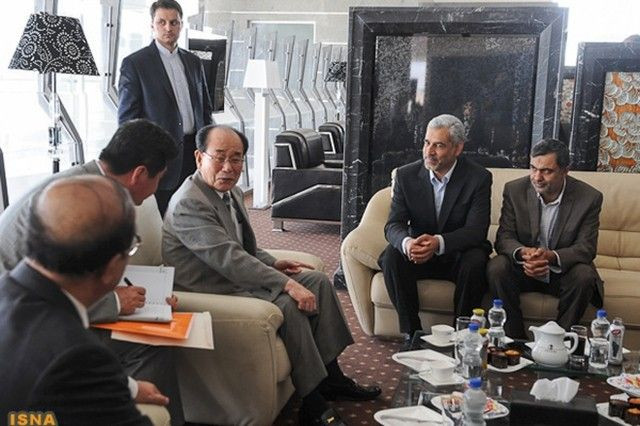Iran Deepens Ties With North Korea; Says Agreement Brought The Nations With 'Common Enemies' Closer

Iran and North Korea announced expansion of bilateral ties Saturday after reaching a scientific and technological cooperation agreement which, according to Iran's Supreme Leader Sayyed Ali Hosseini Khamenei, has brought the two countries with "common enemies" closer.
Iranian state media said the nations will cooperate in research, human resources exchange and joint laboratories and in the fields of information technology, energy, biotechnology, engineering, agriculture and food technology.
Reuters reported, citing Iranian Labour News Agency (ILNA), that the agreement was signed by Iran's Minister for Science, Research, and Technology Farhad Daneshjoo and North Korean Foreign Minister Pak Ui-chun.
Khamenei met with Kim Yong-nam, North Korea's ceremonial head of state, who was in Tehran for the Non-Aligned Movement summit held this week.
"The Islamic Republic of Iran and North Korea have common enemies, because the arrogant powers do not accept independent states," Khamenei was quoted as saying by Iranian media.
Kim said that the expansion of ties with Iran was among the strategic policies of his country. Addressing the summit, the DPRK leader criticized the recent joint military exercise of the U.S. and South Korea in the Korean Peninsula, saying the exercise pushes the Korean Peninsula to the brink of war.
Iranian President Mahmoud Ahmadinejad, in a separate meeting with the DPRK leader, expressed his gratitude to Kim for attending the NAM summit which concluded Friday. Ahmadinejad said Kim's visit would have a "great impact on strengthening bilateral ties, expanding cooperation and boosting the anti-hegemonic front."
In the past North Korea has come under fire for providing Iran with advanced missiles, based on Russian designs, that are much more powerful than anything Washington has publicly conceded that Tehran has in its arsenal.
Iran obtained 19 of the missiles from North Korea, according to Secret American intelligence assessments cable dated Feb. 24, 2010, the New York Times reported in November 2010.
The missiles could, for the first time, give Iran the capacity to strike capitals in Western Europe or easily reach Moscow, the report said, citing data obtained by WikiLeaks. The North Korean version of the advanced missile, known as the BM-25, could carry a nuclear warhead, the report said.
In December 2010, it was reported that a team of Iranian nuclear scientists has been sent to North Korea and that the two governments have agreed on a joint nuclear test in North Korea with a substantial financial reward to Pyongyang.
Iran's deputy foreign minister Hossein Amir-Abdollahian, meanwhile, said the NAM summit "once again confirmed on an international level that the unilateral pressures imposed by the U.S. with the aim of isolating the Islamic Republic are futile."
© Copyright IBTimes 2025. All rights reserved.





















